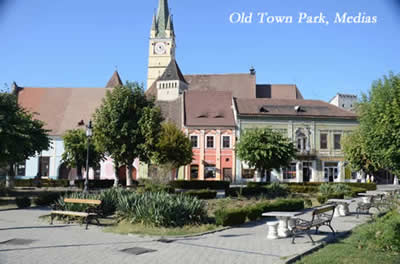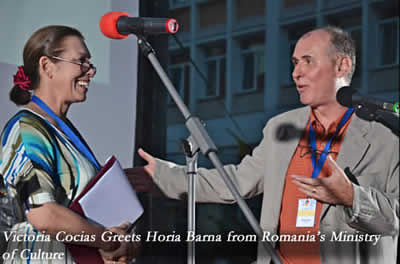MEDIAS, Romania – Here in this hilly, castle-strewn corner of central Europe, Romanian director Radu Gabrea is best known for his track record of over 20 features, documentaries and television movies under his sizeable belt, including his most recent feature, the docudrama The Last Days of Ceaucescu.
What may be less known is that Gabrea, who recently wrapped the second edition of his Medias Central European Film Festival (MeCEFF) here, is something of a whiz in applied mathematics. How else to explain his feat of bringing in 40% more than last year – and doing it with only half the budget and in only half the number of days?
“It was an adventure, let me tell you,” Gabrea sighed, offering no formula for his accomplishment other than “very tough work” in difficult economic times. “But I think what this proves is that we have now become established as a cultural event in Romania. And we’ve done it even though we only had 2-1/2 months to put the whole festival together, after the money finally came through. ” 
With festival sponsors drastically cutting back their funding this year, reflecting the worsening climate for film festival sponsorship in Europe, Gabrea was forced to reduce MECEFF’s length from seven days to four (Sept. 2-6) and to slash its budget to 85,000 euros – about half of last year’s amount.
Gabrea, who runs the festival with his wife, the noted Romanian stage and screen actress Victoria Cocias, credits the festival’s survival in large part to the office of the town’s mayor, Teodor Neamţu. A self-described “number one fan” of MeCEFF, Neamţu again supported the festival this year to the tune of 15,000 euros – the maximum amount allowed under Romanian law. The city also footed the 10,000-euro bill for guest accommodations. “Without the Mayor’s devotion and love for the festival,” Gabrea said, “we simply couldn’t have done it.”
 Luckily for Gabrea, Neamţu won another four-year term earlier this year, precluding the near-certainty that his opponent would have nixed festival funding completely.
Luckily for Gabrea, Neamţu won another four-year term earlier this year, precluding the near-certainty that his opponent would have nixed festival funding completely.
Indeed, for much of the past year the director’s chances for orchestrating a second edition of MeCEFF seemed about as high as this medieval town’s past odds of surviving the plague (which it did – nine plagues in all, not to mention a bout of leprosy since Medias’ founding in 1146). Now, after weathering more than the usual round of budget battles for a local arts organization, MeCEFF’s own survival seems to have become part of a cherished civic tradition.
“If you listen to the people in the streets, you can hear that we have now become established in the town,” enthused Gabrea. “We have become a tradition. The people of Medias have been so supportive and kind to us. And that’s what is most important. I think they truly deserve this festival, and I’m happy about that.” 
Festival volunteer and college student Daniela Vandor seconded that observation. “I grew up in Medias and people here are hungry for this kind of cultural stimulus,” she said. “Now, people have begun to see this as part of our cultural calendar, where we can all join together over movies and music in middle of our town square.”
Gabrea has made sure that Transylvania’s film tradition is accompanied by one of its oldest music traditions, too. Local klezmer bands tooted away at the festival’s opening and closing nights, and day-trips for the 100 or so gests included generous helpings of string quartets and local instrumentalists to adorn the sumptuous lunch spreads of stews, fruits, frigarui (skewered meat) and snitel (breaded meat cutlets). And the ever-present local (and potent) plum elixir, tsuika
 Despite the financial setbacks, Gabrea was determined not to compromise the artistic content of this year’s festival, which is the country’s only competitive festival to honor films exclusively from Central Europe. He scheduled all of the 50+ films originally planned, as well as four symposia on various industry topics.
Despite the financial setbacks, Gabrea was determined not to compromise the artistic content of this year’s festival, which is the country’s only competitive festival to honor films exclusively from Central Europe. He scheduled all of the 50+ films originally planned, as well as four symposia on various industry topics.
“Our rules are very simple,” noted Gabrea. “We select only competition films that have already won national awards in their own countries – the 7 Central European countries,” which include Romania, Poland, Bulgaria, Hungary, Austria, the Czech Republic and Slovakia. Also included is one guest country each year – the “+1” noted in the festival’s title. Last year, that country was Israel; this year it is the United States, specifically Hollywood films made with Romanian-born talent and which were screened as part of the festival’s “Romanian Artists in Hollywood” series.
“I invited films made by renowned artists in Hollywood that were born or lived primarily in Romania,” said Gabrea. Among them: Johnny Weissmuller, star of the Tarzan movies of the ‘30s and  ‘40s, who was born in Timisoara when it was still part of the Austro-Hungarian Empire; Edgar G. Robinson, born Emmanuel Goldenberg in Bucharest and best remembered as the star such gangster films of the 30s and 40s such as Little Caesar (1931) and Key Largo (1948); and Jean Negulesco, born in Craiova and the director of Humoresque (1946), Johnny Belinda (1948) and How to Marry a Millionaire? (1953) starring Marilyn Monroe.
‘40s, who was born in Timisoara when it was still part of the Austro-Hungarian Empire; Edgar G. Robinson, born Emmanuel Goldenberg in Bucharest and best remembered as the star such gangster films of the 30s and 40s such as Little Caesar (1931) and Key Largo (1948); and Jean Negulesco, born in Craiova and the director of Humoresque (1946), Johnny Belinda (1948) and How to Marry a Millionaire? (1953) starring Marilyn Monroe.
Also included in the retrospective were Maia Morgenstern, best known for portraying Jesus’ mother Mary in Mel Gibson’s controversial The Passion of the Christ (2004), and noted Romanian actor Marcel Iures, whose Hollywood credits include The Peacemaker (1997) starring George Clooney and Mission: Impossible (1996) starring Tom Cruise.
 Gabrea and the festival’s executive director, Gabriela Bodea, also managed to snag the same attractive festival venues as last year, including the Town Hall Square, the Casa Traube (where many of the 100+ festival guests and where many of the screenings were housed), the Cinema Mediensis and the town’s historic synagogue, site of a handful of screenings of historic Yiddish films.
Gabrea and the festival’s executive director, Gabriela Bodea, also managed to snag the same attractive festival venues as last year, including the Town Hall Square, the Casa Traube (where many of the 100+ festival guests and where many of the screenings were housed), the Cinema Mediensis and the town’s historic synagogue, site of a handful of screenings of historic Yiddish films.
This year’s Best Film, announced at the closing ceremony in the Town Hall Square by jury chief Alberto Castellano, went to the Polish film Rosa, from director Wojciech Smarzowski. Matej Minac took home the best director prize for the Slovak-Czech-Canadian-American co-production Nicky’s Family, while Vladimir Javorsky garnered Best Acting honors for his role as Jarda in the Czech film Poupata. The Best Cinematography award was given to Jure Cernek for the Slovenian film Arheo.
Taking the MeCEFF’s Audience Award was Jane Campion’s The Piano, screened as part of the “Romanian Artists in Hollywood” series recognizing the movies of Harvey Keitel, who is the son of Jewish immigrants from Romania and Poland. Also recognized on stage were festival jury members Anca Mitran, Manuela Cernat, Costel Safirman and Călin Stănculescu.
Still, despite all the civic pride and the success of this year’s run, no one is expecting a easy road ahead for staging next year’s festival – at least if 2012 was any indication.
Gabrea ruefully noted that last year’s main commercial sponsors, Romgaz and Transgaz (key companies in a city that sits atop the largest natural gas field in Romania), cut their contributions this year by around 80% due to budget constraints.
“It was very tough,” Gabrea said. “Still, they did as much as they could do, and I was very happy that the head of Romgaz, at the very last minute, gave me his support.”
Meanwhile, government subsidies from the Ministry of Culture were severely delayed due partly to the country’s recent political crisis. (Romania’s president was ousted by the national legislature in July and replaced by a highly controversial interim president, who himself was replaced by the original president, via court mandate, after only six weeks in power).
 All this was against the backdrop of more bad news: recently the new government slashed the budget of the Romanian Cultural Institute, the leading venue for promoting and supporting Romanian film internationally, disabling programs and events that filmmakers and audiences in Romania and abroad cherished.
All this was against the backdrop of more bad news: recently the new government slashed the budget of the Romanian Cultural Institute, the leading venue for promoting and supporting Romanian film internationally, disabling programs and events that filmmakers and audiences in Romania and abroad cherished.
While not affecting MeCEFF directly, such recent cultural and political upheavals have frustrated entrepreneurs like Gabrea, motivating them to become even more aggressive and persistent in pursuing their cultural ventures in the future.
“Such stupid things were done in this country during this crisis,” sighed Gabrea, “that I don’t know what the political future here will be.” Still, he insisted his film festival would continue to remain “completely independent” of all parties and politics.
“I have no idea how I can be optimistic for next year, but I am,” he laughed, “That’s probably due to my nature. I think I will find the people to support this festival. I think I will find the good guys to help me do it.”

